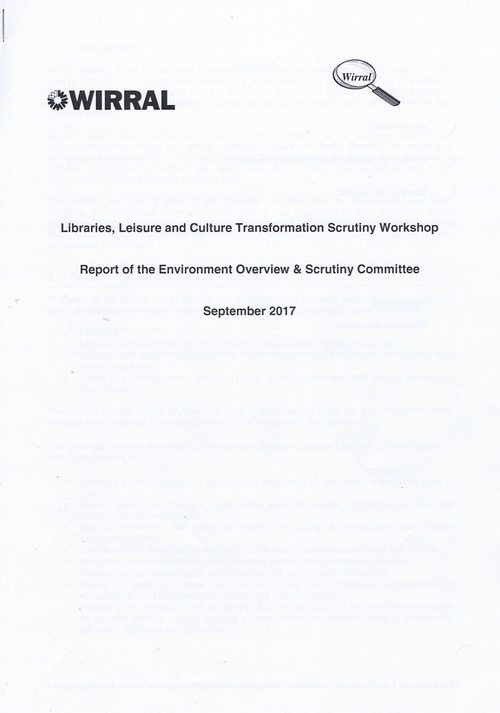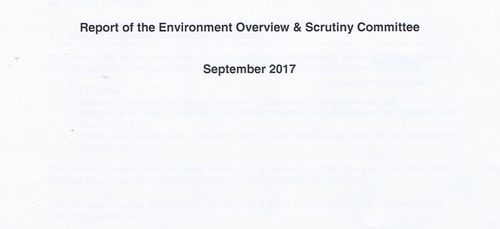Improvement Board Review Consultation
Wirral Council is currently running a consultation on a review of the Improvement Board as it looks likely that in the near future the joint Wirral Council/Local Government Association Improvement Board will cease to be. Members of the public can also submit questions to be asked about the review when the Improvement Board meets in public session on Friday (the deadline for questions is 5pm on Thursday).
The report makes interesting reading, I thought I’d just quote from a few sections along with some comments of my own. Quotes are in bold.
“Wirral now is a very different place and has demonstrated an ability to manage some very challenging situations. This ability needs to be sustained and to grow. This report enables us to risk assess whether this is likely to happen.”
This could be read a number of different ways, “manage some very challenging situations” would sound to some like getting better at spin/reputation management. The author of this comment (the Chair of the Improvement Board) seems to be sceptical as to whether Wirral Council’s ability to manage can happen in the future.
“Its aim was to help Wirral to deal with the fundamental corporate challenges it faced, not to respond to individual complaints or reports. It now feels right that the Council and the LGA jointly agree the next phase based upon the recommendations in this report.”
This statement seems rather strange as it was individual complaints and reports that highlighted the “fundamental corporate challenges” that Wirral faced. Had Wirral Council responded (and changed as opposed to just saying they would) as a result of the “individual complaints and reports” things wouldn’t have got as bad as they were.
“At first, as we looked into Wirral’s difficulties, we found further serious issues in addition to those already shared. As we looked at these we felt that some denial was creeping in.”
Ah denial, a speciality of Wirral Council, you can just imagine Wirral Council saying to the Improvement Board, “I feel fine. This can’t be happening, not to me.” It also hints at the fact that in addition to denial there was another factor of Wirral Council’s culture the “conspiracy of silence” otherwise known as “burying your head in the sand”.
“We offered advice, an essential part of our role, to ensure things were not denied or made worse.”
Ah denial is not just a river in Egypt but also flowed through Wirral Council? Many people have tried to offer advice to Wirral Council in the past (some such as external legal firms paid extremely handsomely to do so), wordy reports have been produced with many recommendations, but “fundamental corporate challenges” are a result of cultural issues and will only change when people’s attitudes change.
“One of the real joys has been to see Wirral learning from others, challenging themselves in peer review and growing in confidence about their strengths and ability to contribute particularly in Merseyside.”
Wirral Council is now described in terms that parents usually use for their children.
“Wirral was also considered to be lacking in openness and transparency, and this led to the reputation of the council to be weakened in the eyes of our residents, MPs and the press.”
There are some that would say abolishing the eleven Area Forums which met three times a year and had a standing agenda item at which the public could ask questions they didn’t have to submit in advance and Wirral Council’s recent desire to turn down many recent Freedom Of Information requests claiming exemptions are backward steps with regards to openness and transparency.
“Financial and strategic planning were weak, and systems and processes needed to protect the Council from being exposed to significant risks were not in place effectively, and/or were not
complied with consistently.”
Well Wirral Council’s auditors kept telling them that and Wirral Council kept failing the value for money assessment year after year.
“This created an environment where trust, clarity of responsibilities, vision and strategic planning were not able to flourish, and resulted in behaviours which prevented the Council from being able to serve its community in a way which any ordinary council would want to.”
Again behaviour is referred to which is the result of a culture at Wirral Council.
“These issues culminated in the publication of the AKA report in January 2012.”
Err no, the AKA report was never published in full. Yes, the main body of the report was published, but the seventeen appendices (referred to as annexes in the report) weren’t. These amounted to a few hundred pages of material sent to Wirral Council by AKA with her report that Wirral Council didn’t publish (although its understandable with regards to annex L). This unpublished documents included minutes of a meeting where councillors agreed to the “special charging policy” and wouldn’t have fitted with the narrative that it was all the work of two former Social Service managers.
For reference a list of these appendices are below:-
A Appendices as Referred to in the Report
B Equality & Human Rights Commission Letter Dated 29 December 2010
C First Improvement Plan
D Care Quality Commission Inspection Report
E Charging Policy for Supported Living Services
F Documents Relating to 27 Balls Road
G Standards for England Decision Notices
H Documents Relating to Reimbursement Claims
I Emails Relating to Supported Living Contracts
J Documents Relating to Service Provider 2
K Documents Relating to Service Provider 3
L Medical Information Relating to Martin Morton (MEDICAL IN CONFIDENCE)
M Documents Relating to Service Provider 4
N Minutes of Adult Protection Strategy Meetings Relating to Service Provider 4
O Documents Relating to the Safeguarding Adults Unit
P Minutes of the DASS Monitoring & Development Sub Group Meeting Held on 11 December 2008
Q Employment Dates for WMBC Employees
“Trust and respect needs to be developed between politicians and senior management.”
One of the criticisms in the past was that certain politicians and senior management were so trusting of each other that the politicians didn’t properly hold the officers to account. Maybe more trust and respect needs to develop between these two groups and the Wirral public they are there to serve.
“The need to establish effective governance procedures, particularly with regard to risk management, whistle blowing and audit. Also to ensure there is a clear protocol for sharing information with Members and a clear scheme of delegation. The expectation is that this will contribute to developing a culture of openness rather than
secrecy.”
The constitution includes a “clear scheme of delegation” and if councillors or officers are unsure about how a particular decision is delegated to they should read it! Any employee considering blowing the whistle that knew how previous whistleblowers had been treated would be deterred from doing so if they wanted to remain an employee of Wirral Council (and in the current economic climate there is a lot of competition for vacant jobs). Some have only chosen to blow the whistle after they’ve left the employment of Wirral Council.
“It is proposed to strengthen the independent nature of the Audit and Risk Management Committee through the appointment of a majority of external members.”
This is an interesting recommendation, but would the Audit and Risk Management Committee also have an independent Chair that wasn’t a councillor of the same party as the current administration? I know at least on one other Council the convention is that the Chair of the Audit and Risk Management Committee is always an opposition councillor, as the view is that when the Chair is of a different political party to the ruling administration that the Chair can be free to say what they like without the worry that their party would censure them for highlighting something embarrassing that the ruling administration would prefer to remain out of the public domain.
The current Local Audit and Accountability Bill going through Parliament is discussing a legal requirement on Councils for auditor panels (with the option that a Council’s Audit and Risk Management Committee could be nominated as the auditor panel) with the majority of members of the auditor panel being independent members.
“Members have been very engaged in the process and initial feedback is mostly positive, although concerns have been raised about the size of the scope for the Families and Wellbeing Policy & Performance Committee.”
Having one scrutiny committee that covers both education and social care (that together consume a majority of the Council’s budget), that’s already large at about fifteen councillors, plus the half a dozen or so education co optees required by law is too large a committee in both numbers and remit. I think it needs to be split into two committees one focussing on education, the other on social care & health.
“The Council has strengthened the ways in which people can raise their concerns, including the Whistle-blowing and Grievance policies, which will be further reviewed in the light of recent legislative changes.”
I’m curious as to what the “recent legislative changes” referred to are.
“Wirral had one of the highest numbers of Freedom of Information requests in the country.”
Personally I think this is a bit of a myth, I know a number of years ago Wirral Council published in a report how many freedom of information requests they received along with other Councils on Merseyside. I got population figures and calculated the FOI requests per a thousand population. Wirral wasn’t even the highest or second highest out of the Councils on Merseyside. The Council with the highest number of FOI requests per a thousand of population I seem to remember was Sefton (the explanation perhaps being is that there are a number of parish Councils in the Sefton area). Even Liverpool City Council’s FOI requests per a thousand population were higher than Wirral’s.
“leading to a requirement in this last year by the Information Commissioner for Wirral to achieve an audited 85% response rate over a three year period.”
I thought the monitoring by the Information Commissioner was over a three-month, not three-year period, maybe someone can enlighten me with a comment as to whether I or the author of the Improvement Board Review report is right?
“A Leader’s Board has been established as a key mechanism for the Chief Executive to engage with Political Group leaders. These sessions provide an opportunity to discuss emerging issues and increase collaboration on key issues such as changes to the constitution.”
Well I might make a FOI request for the Leader’s Board minutes, however I thought proposed changes to the constitution (which have to be agreed by Council) was the remit of the Standards and Constitutional Oversight Committee?
“It is crucial that the Council embeds a shared understanding regarding what behaviours are appropriate” when developing relationships internally and externally.”
Again the Improvement Board review highlights a certain amount of inertia to changing Wirral Council’s culture and working practices.
“A number of the critical reports received by the Council were a result of staff not being listened to appropriately and issues raised not being dealt with in a timely manner.”
This states the obvious and is what the Wirral public have known about for a long time.
“The key changes regarding corporate governance and decision making have significantly contributed to promoting a culture of openness rather than secrecy.”
As detailed earlier some of the changes have led to less openness so do this just mean more internal openness or openness with the public at large?
“Decisions are made in a transparent way, and information is more easily available to the public, this is demonstrated by the publication of all decisions made under delegation.”
Ha ha, it’s a legal requirement on Wirral Council that the decisions made under delegation by individual Cabinet Members are published. It’s not some voluntary thing that Wirral Council does because of a desire for openness!
“Wirral had one of the highest numbers of Freedom of Information requests in the country”
Oh here we go with this myth again, the raw numbers of FOI requests need to be adjusted for the varying population figures of different Councils across the country. When that’s done Wirral’s number of FOI requests isn’t unusual at all.
“In the event of a performance exception, senior managers attend Committee meetings to present an action plan detailing how they intend to get back on target.”
Yes but there’s only a “performance exception” if the statistics for that indicator are reported. I was recently at a Committee meeting where a performance indicator relating to HR was not reported. Councillors took the non-reporting of this performance indicator as a performance exception, but as it couldn’t be established that a performance exception had occurred (as the statistics for it weren’t given) a senior manager from HR wasn’t there to answer questions from councillors.
“In particular it will be important to review the changes through Members surveys, staff surveys and feedback from the local community.”
Exactly how will “feedback from the local community” on the changes happen? Does this mean someone emailing a councillor, going to their surgery, signing a petition or a formal consultation (or maybe all of them)?
“The first couple of meetings of the Improvement Board were examples of things that you would not see in
most Councils. These included late papers, confused reports tabled on the day and rooms not set up, little clarity of roles and a substantive number of the senior management team excluded from meetings. In terms of atmosphere there was not surprisingly a feeling of confusion and fear. One of the most chilling quotes from the AKA report was that
the ‘abnormal had become normal’.”
Ah yes, welcome to Wirral and its “bureaucratic machinations”.
“Tough decisions have to be made to deliver change. Changing culture sometimes requires changing people.”
This is true.
“One area that it would be valuable for the LGA to consider for future arrangements is the relationship between the Board and the public and local community. It is an opportunity to improve transparency, but it should not be seen as a mechanism for dealing with individual complaints or to take the place of the appropriate methods for
dealing with complaints. Managing public expectations and determining how best the Improvement Board relates to the public needs to be carefully thought through.”
The Improvement Board replaced the Corporate Governance Committee (which met in public), my suggestion is that Improvement Boards should meet in public, not private. When the Cabinet agreed to the setting up of the Improvement Board it wanted every third meeting of the Improvement Board to be in public, instead the first two or three items are in public then the public are ushered out and the Improvement Board meets in private. Without the accountability of meeting in public, the public will always be sceptical that it is not acting in a transparent way. Meeting in public would prevent some of the criticism such as late reports as reports would have to be published on the website a week before the meeting. The public either don’t have (or don’t know of) any other avenues for dealing with complaints as opportunities for public engagement (such as public question time at Area Forums) have been removed. Individual complaints can also be an indication of wider problems that fall within the Improvement Board’s remit.
If you click on any of these buttons below, you’ll be doing me a favour by sharing this article with other people. Thanks:
53.402022-3.070415






